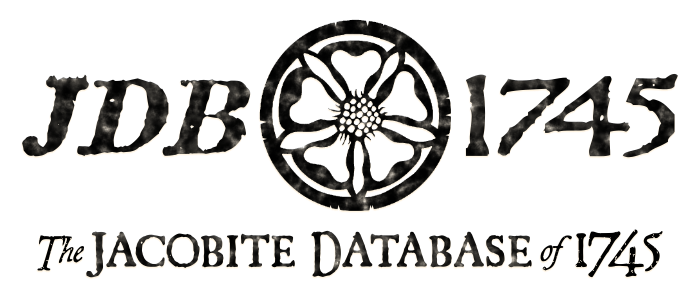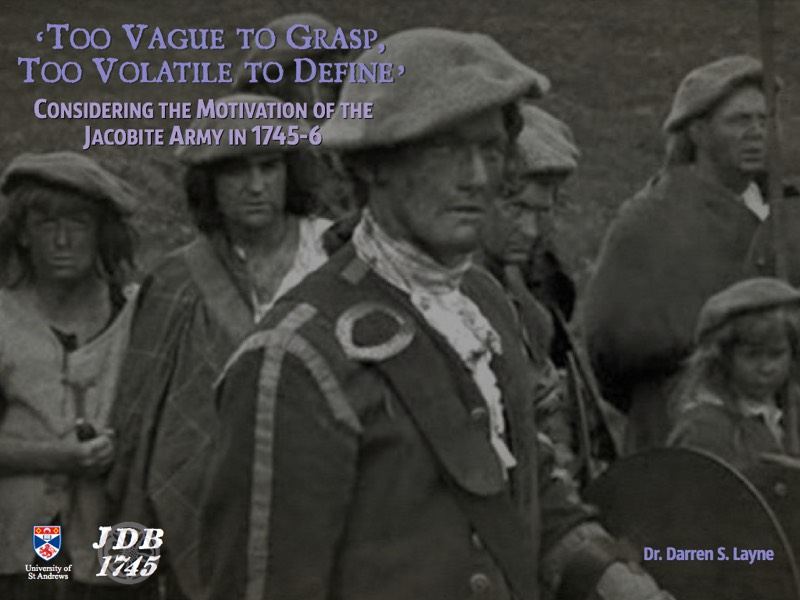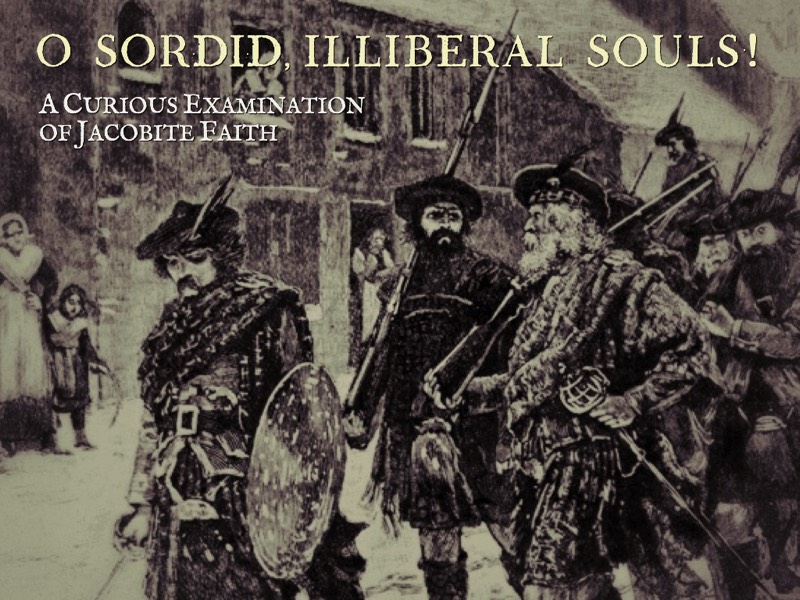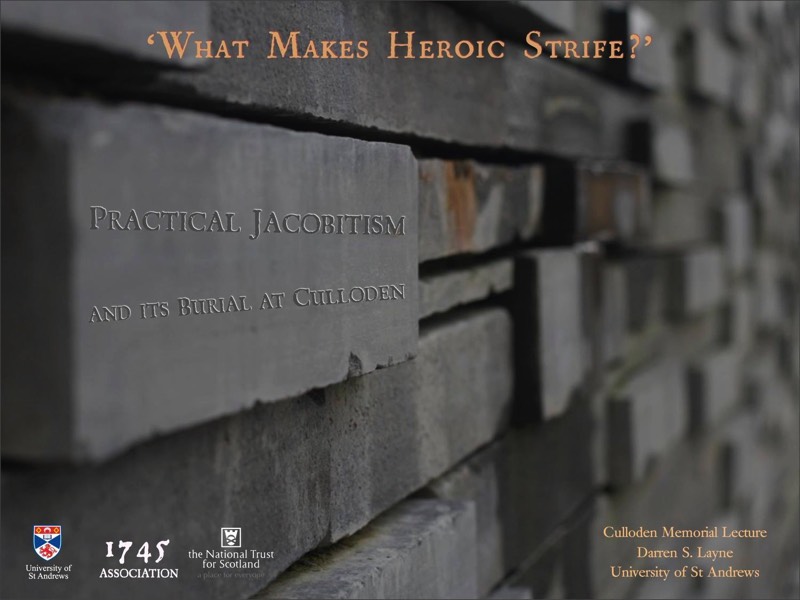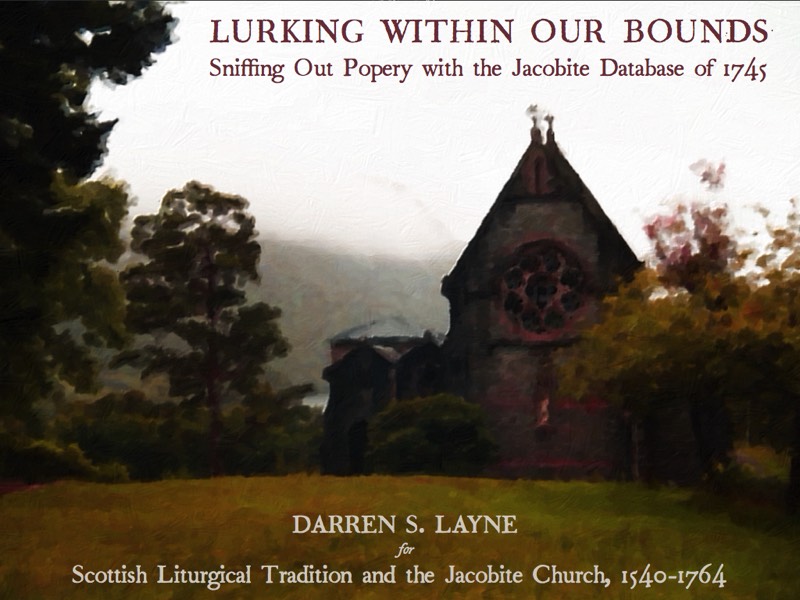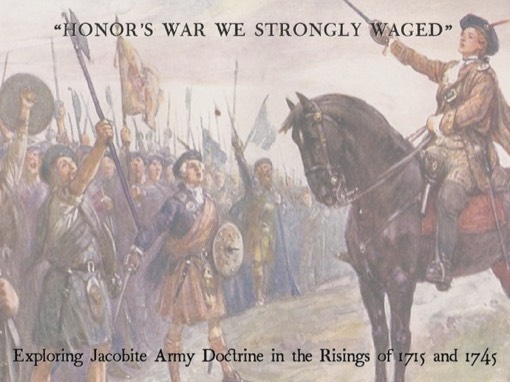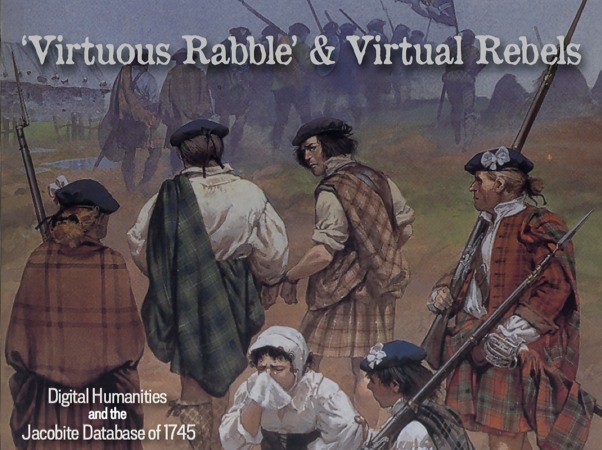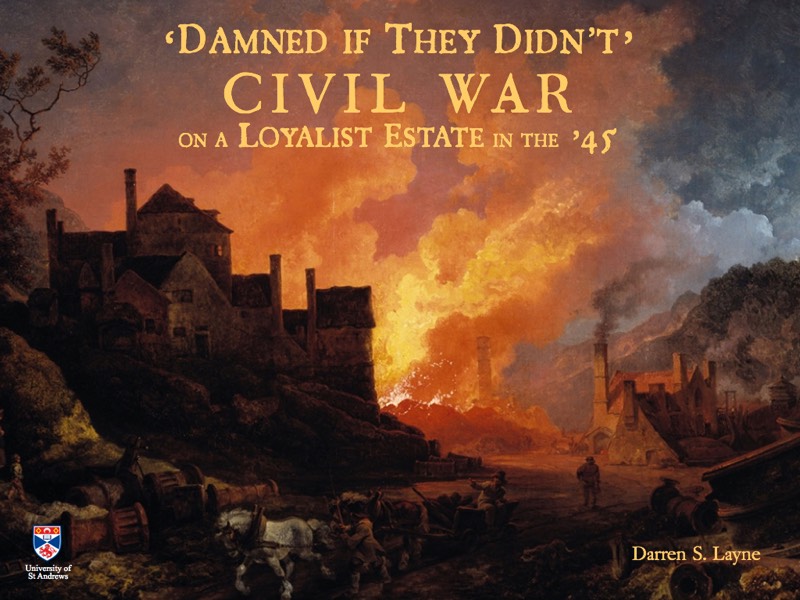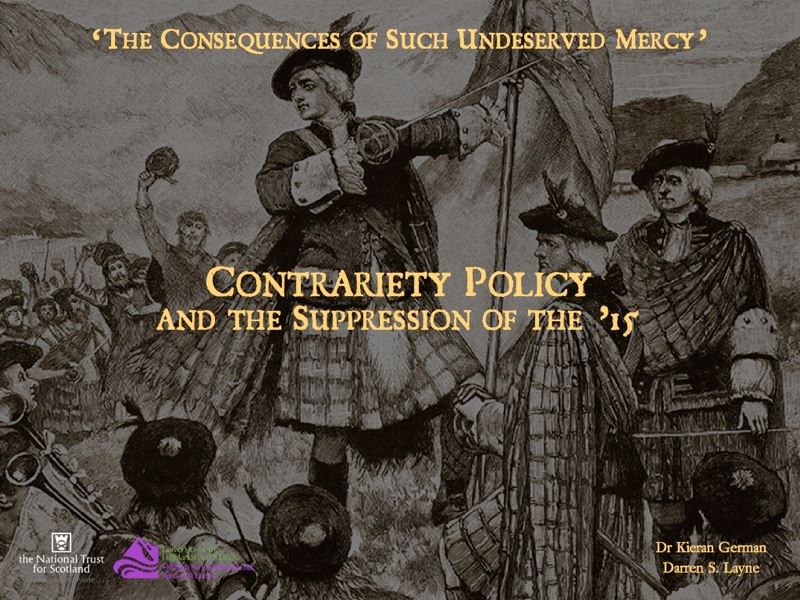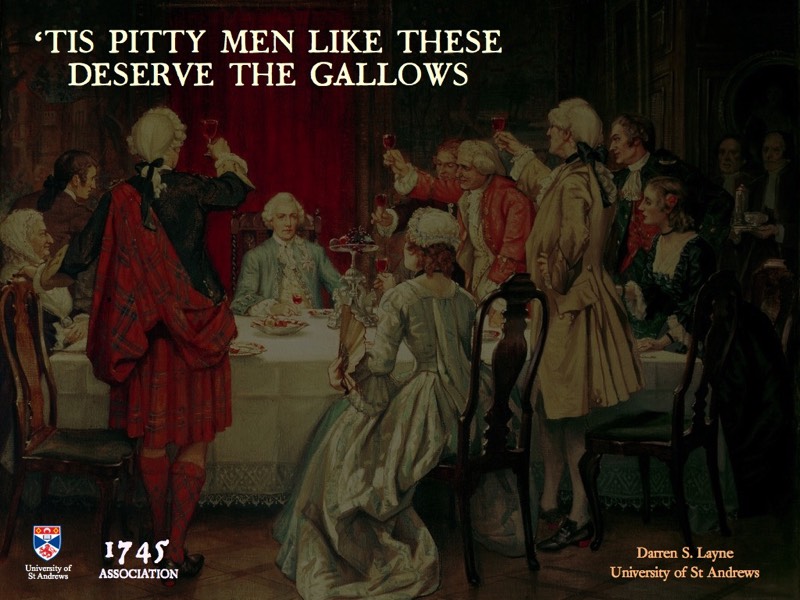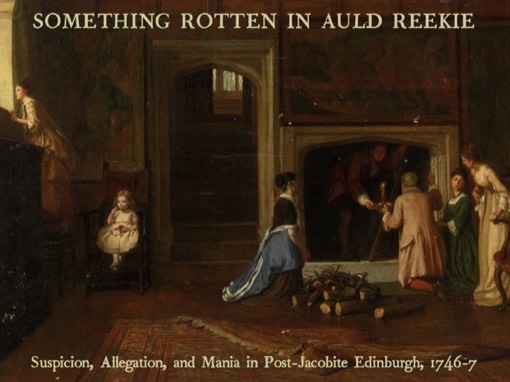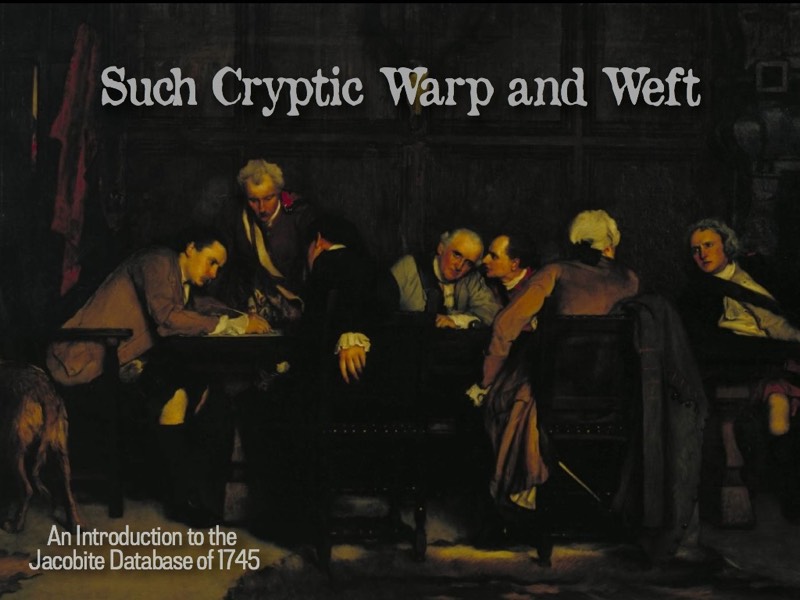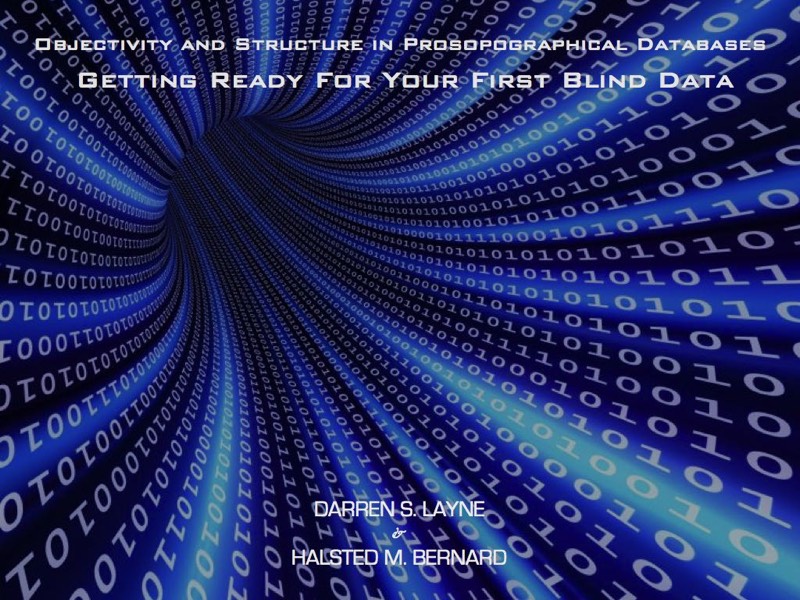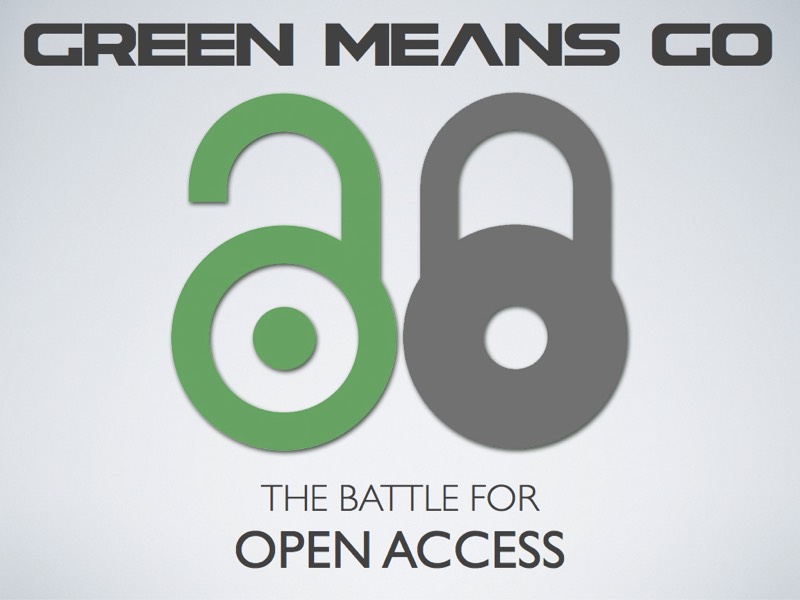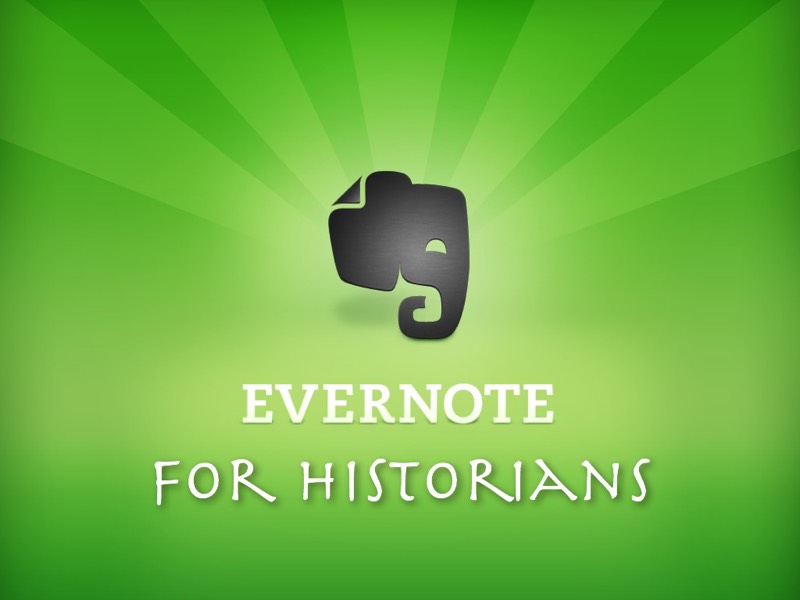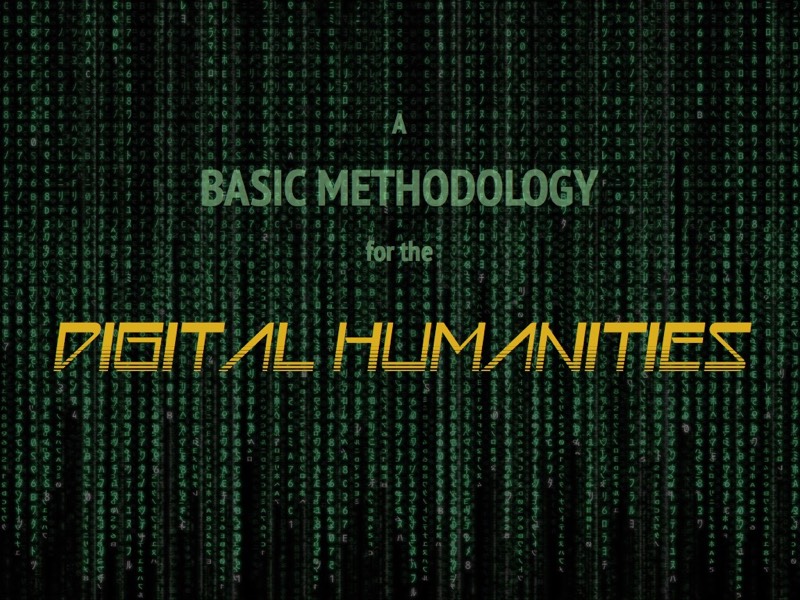Papers & Presentations by the JDB1745 Team
Historical Presentations
'Too Vague to Grasp, Too Volatile to Define'
Considering the Motivation of the Jacobite Army in 1745-6
Watch this lecture here (via Inverness Outlanders).
Presented at:
Lecture for the 272nd Anniversary of the Battle of Culloden
National Trust for Scotland
Culloden Battlefield & Visitor Centre
Saturday, 14 April 2018
‘O Sordid, Illiberal Souls!’
This short paper is a comprehensive analysis of this list of 170 Jacobite prisoners taken at Carlisle which, after being cross-referenced with a variety of other sources using JDB1745, provides an illustrative example of the wide breadth of persons who made up the ranks of the Jacobite army. In addition to discussing faith, models of locale, age, regimental recruitment, and nationality are assessed. The study is then finished up with some thoughts on best practices for critically analyzing the data that has been compiled.
Institute of Scottish Historical Research Reading Weekend 2015
The Burn, Glenesk, Brechin
Saturday, 29 March 2015
‘What Makes Heroic Strife?’
1745 Association Culloden Battlefield Memorial Lecture
National Trust for Scotland
Culloden Battlefield & Visitor Centre
Friday, 17 April 2015
Lurking Within Our Bounds
Presented at:
Scottish Liturgical Tradition and the Jacobite Church, 1540-1764
The Old Brewery, Cromarty
Sunday, 23 June 2014
Honor's War We Strongly Waged
Presented at:
National Trust for Scotland
Saturday, 5 October 2013
(co-presented with Dr Kieran German)
‘Virtuous Rabble’ & Virtual Rebels
Digital Huma
nities and the Jacobite Database of 1745This brief introduction will include a survey of resources, methodology, and application, and will be accompanied by a visual presentation of a working sample dataset as well as a cursory explanation of the implemented technology and how the project fits in with the burgeoning field of Digital Humanities.
Presented at:
3rd Jacobite Studies Trust Conference
Saturday, 6 July 2013
‘Damned If They Didn't’
Presented at:
Scotland: Communication and Conflict
Scottish Society for Northern Studies Day Conference
Augustine United Church, Edinburgh
Saturday, 21 November 2015
4th Jacobite Studies Trust Conference
Saturday, 1 July 2017
‘The Consequences of Such Undeserved Mercy’
Lecture for the 300th Anniversary of the 1715 Rising
National Trust for Scotland & UHI Inverness
Culloden Battlefield & Visitor Centre
Friday, 24 October 2015
(co-presented with Dr Kieran German)
‘Tis Pity Men Like These Deserve the Gallows
Before we speak about Jacobitism like a museum exhibit safely tucked behind glass with an informative plaque for us to antiseptically ponder, it is vital that we look to the minutia – the small stories in between the large ones that form the meat and bones of the movement. They cannot be discounted and should not be overlooked, and how they reflect our struggles today only goes to reinforce the fact that, despite the undercurrent of great change in our own time, all of us are simply trying to get by as best as we can."
1745 Association Gathering 2014
Strathburn Hotel, Inverurie, Aberdeenshire
Saturday, 13 September 2014
Something Rotten in Auld Reekie
New Directions in Jacobite Studies
Institute of Historical Research, London
Tuesday, 20 August 2013
Such Cryptic Warp and Weft
Institute of Scottish Historical Research Reading Weekend
Stroove House, Skelmorlie
Saturday, 3 March 2012
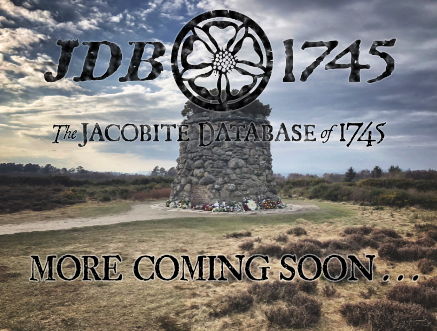
Digital Humanities & Technology Presentations
Getting Ready for Your First Blind Data
A joint presentation between Halsted and Darren,
this paper serves as an introduction to and a discussion of some of the core aspects of JDB1745 and how it was designed. We focus on some important facets which are sometimes overlooked or underprepared by researchers, coders, and data-gatherers alike: how to think about and structure information before it even makes its way into your project. Halsted also shares details about the model that we have designed to create the bones of JDB1745 and why it is different to what we have seen out there so far.We then shore things up by explaining authority records and how they are absolutely essential to the organization of your data, addressing perhaps the most onerous aspect of historical study: ambiguity.
Mapping Flows & Visualising Data in the Era of Digital Humanities
Centre for Transnational History
University of St Andrews, Scotland
Friday, 29 August 2014
(co-presented with Halsted M. Bernard, MLIS)
Green Means Go
This presentation was given at the 2013 Institute of Scottish Historical Studies Reading Weekend to explain the truths and myths of the extremely relevant and hotly-contested topic of scholarly Open Access in both the Sciences and the Humanities, while also serving as a brief survey of the current state of OA within the global university system and beyond.
It is meant to cut through some of the politicking and misinformation that muddies the issue in the popular media, and offers the audience some idea of what all the fuss is about so individuals can make their own decisions about the movement and its arguable value in furthering our disciplines.
Arguments for and against different types of OA are outlined, with descriptions of the scholarly publishing cycle, the Research Councils UK's place in it, and how the REF is cyclically supported both by the proceeds from scholar-side article processing charges and the institutional subscriptions that are foisted upon university and public libraries. Also included are discussions about how prestige and impact are manufactured and how altmetrics can shed light upon and reshape how we view the entire publishing and engagement process.
Institute of Scottish Historical Research Reading Weekend
The Burn, Glenesk, Brechin
Saturday, 13 April 2013
Evernote and Zotero for Historians
"In short, Evernote is a total solution for digital organization, which naturally makes it a very effective tool for modern historians. Think of Evernote as a multimedia repository that you can set up any way you like.
It handles any types of files you can think of, and it lets you get to them when you need to, in any way you’re most comfortable with. The more you put in it, the more useful Evernote gets. It becomes your own personal library of digital media."
This short presentation introduces the basics of what the Evernote platform is about and how scholars of the Humanities can easily benefit from it. Numerous live-use case studies are illustrated, covering workflows including: preparing for an archival visit with syncable checklists, uploading digital images to notebooks and keeping them organized, transcribing archival documents right within the app, and how to find exactly what is needed using the robust search capabilities of Evernote.
Research Tools and Outputs for the 21st-Century Postgrad
Early Modern & Modern History Postgraduate Forum
University of St Andrews, Scotland
Monday, 6 October 2014
(co-presented with Halsted M. Bernard, MLIS)
A Basic Methodology for the Digital Humanities
"The intention of this brief fly-over survey of methods for the Digital Humanities is simply to provide you with a basic understanding of its existence and scope - what DH is, what it looks like, why it might be important or helpful for your studies and research, and generally, what all the hype is about.
You might even already be a Digital Humanist and not even know it. (Don’t worry; it’s not catchy like a superbug, and it doesn’t prevent one from also being a solid traditional historian.)
We will be addressing what the discipline consists of, including media and display, outreach and promotion, and pedagogy and process. We will also be looking at some existing DH projects, as well as a few excellent productivity tools that might make your historical research more organized and effective.
In twenty minutes or so, I hope you’ll be a bit clearer on judging if these digital methods are right for you, and if they might help you in our shared quest to be productive and well-rounded historians."
Modern History Postgraduate Forum
Wednesday, 8 May 2013
LINKS
CONTACT
Historical Research,
Transcription & Analysis
Digital Management
SOCIAL MEDIA
ABOUT
All content, design, and publishing rights are properties of
Darren Scott Layne.
